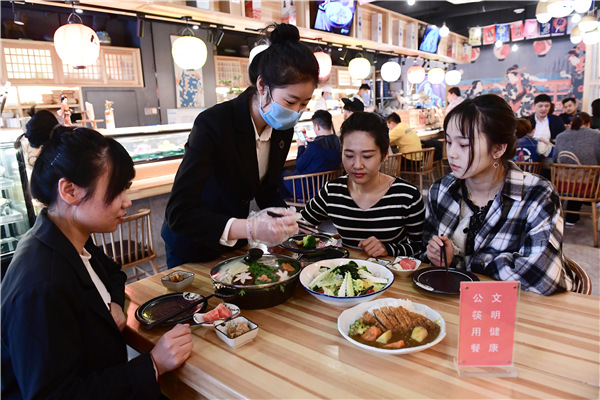

Since local transmission of the disease has been effectively brought under control, the majority of restaurants in China have fully reopened. They're now gearing up for the upcoming New Year holiday in early January and the Spring Festival holiday in mid-February. Both holidays are prime times for Chinese people to gather with friends and family members and enjoy hearty meals.
Wang Mingming is the manager of a branch of Hua's Restaurant, a traditional Chinese food chain in Beijing known for its Peking duck and crawfish. He said business at the establishment in Dongcheng district had largely returned to normal since August.
In addition to universal public health measures such as taking temperatures of patrons, providing hand sanitizer and stepping up disinfection, Wang said use of communal chopsticks has also become a mainstay.
"We began offering designated serving chopsticks in May," he said."Each smaller table in the hall with two to four sittings will be given one pair. At private dining rooms that usually host a banquet of more than six people, each dish will be served with one pair."
Communal utensils at Hua's restaurant are customized and marked by gongkuai, Chinese characters for "public chopsticks," in bold, red prints.
"Based on my observation, all diners at the large rooms use the communal chopsticks," he said. "For those seated in two or three, the usage rate of these designated utensils is about 60 to 70 percent."
Hua's restaurant also began offering more items in individual or smaller portions on its menu.
"For instance, customers ordering Bawang chicken-a spicy chicken salad-can choose to take one platter, half the platter or an individual portion," he said."It turns out many diners prefer the smaller size either because they're concerned about food hygiene or because they want to avoid wasting food."
However, not all Chinese dishes can be easily dissected and portioned without compromising flavor and presentation.
At Cui Hua Lou in Beijing, a one-Michelin-starred restaurant specializing in cuisines from Shandong province, most soup and pork dishes can be served in individual portions. That's according to a manager at one of its two chains in Beijing, who is surnamed Chen.